Received August, 1882.
(*) Except in so far, that he constantly uses the terms "God" and "Christ" which taken in their esoteric sense simply mean "Good" — in its dual aspect of the abstract and the concrete and nothing more dogmatic, Eliphas Levi is not in any direct conflict with our teachings. It is again a straw blown out of a hay-stack and accused by the wind to belong to a hay-rick. Most of those, whom you may call, if you like, candidates for Deva Chan — die and are reborn in the Kama-Loka "without remembrance"; though (and just because) they do get some of it back in the Deva-Chan. Nor can we call it a full, but only a partial remembrance. You would hardly call "remembrance" a dream of yours; some particular scene or scenes, within whose narrow limits you would find enclosed a few persons — those whom you loved best, with an undying
Letter №70-C
Letter №70-C (ML-20c)
Mahatma K.H. - A.P. Sinnett
August, 1882
Pages - 29.
Page 1
Page 2
love, that holy feeling that alone survives, and — not the slightest recollection of any other events or scenes? Love and Hatred are the only immortal feelings, the only survivors from the wreck of Ye-damma, or the phenomenal world. Imagine yourself then, in Deva-Chan with those you may have loved with such immortal love; with the familiar, shadowy scenes connected with them for a background and — a perfect blank for everything else relating to your interior, social, political, literary and social life. And then, in the face of that spiritual, purely cogitative existence, of that unalloyed felicity which, in proportion with the intensity of the feelings that created it, last from a few to several thousand years, — call it the "personal remembrance of A. P. Sinnett" — if you can. Dreadfully monotonous! — you may think. — Not in the least — I answer. Have you experienced monotony during — say — that moment which you considered
Page 3
then and now so consider it — as the moment of the highest bliss you have ever felt? — Of course not. — Well no more will you experience it there, in that passage through the Eternity in which a million of years is no longer than a second. There, where there is no consciousness of an external world there can be no discernment to mark differences, hence, — no perception of contrasts of monotony or variety; nothing in short, outside that immortal feeling of love and sympathetic attraction whose seeds are planted in the fifth, whose plants blossom luxuriantly in and around the fourth, but whose roots have to penetrate deep into the sixth principle, if it would survive the lower groups. (And now I propose to kill two birds with one stone — to answer your and Mr. Hume's questions at the same time) — remember, both, that we create ourselves our devachan as our avitchi while yet on earth, and mostly during the latter days and even moments of our intellectual, sentient lives. That feeling which is the strongest
Page 4
in us at that supreme hour; when, as in a dream, the events of a long life, to their minutest details, are marshalled in the greatest order in a few seconds in our vision (1) — that feeling will become the fashioner of our bliss or woe, the life principle of our future existence. In the latter we have no substantial being, but only a present and momentary existence, — whose duration has no bearing upon, as no effect, or relation to its being — which as every other effect of a transitory cause will be as fleeting, and in its turn will vanish and cease to be. The real full remembrance of our lives will come but at the end of the minor cycle — not before. In Kama Loka those who retain their remembrance, will not enjoy it at the supreme hour of recollection. — Those who know they are
(1) That vision takes place when a person is already proclaimed dead. The brain is the last organ that dies.
Page 5
dead in their physical body — can only be either adepts or — sorcerers; and these two are the exceptions to the general rule. Both having been "co-workers with nature," the former for good, the latter — for bad, in her work of creation and in that of destruction, they are the only ones who may be called immortal — in the Kabalistic and the esoteric sense of course. Complete or true immortality, — which means an unlimited sentient existence, can have no breaks and stoppages, no arrest of Self-consciousness. And even the shells of those good men whose page will not be found missing in the great Book of Lives at the threshold of the Great Nirvana, even they will regain their remembrance and an appearance of Self-consciousness, only after the
Page 6
sixth and seventh principles with the essence of the 5th (the latter having to furnish the material for even that partial recollection of personalitywhich is necessary for the object in Deva Chan) — have gone to their gestation period, not before. Even in the case of suicides and those who have perished by violent death, even in their case, consciousness requires a certain time to establish its new centre of gravity, and evolve, as Sir W. Hamilton would have it — its "perception proper" henceforth to remain distinct from "sensation proper." Thus, when man dies, his "Soul" (fifth prin.) becomes unconscious and loses all remembrance of things internal as well as external. Whether his stay in Kama Loka has to last but a few moments, hours, days, weeks, months or years; whether he died a natural or a violent death; whether it occurred in his young or old age, and, whether the Ego was good,
Page 7
bad, or indifferent, — his consciousness leaves him as suddenly as the flame leaves the wick, when blown out. When life has retired from the last particle in the brain matter, his perceptive faculties become extinct forever, his spiritual powers of cogitation and volition — (all those faculties in short, which are neither inherent in, nor acquirable by organic matter) — for the time being. His Mayavi rupa may be often thrown into objectivity, as in the cases of apparitions after death; but, unless it is projected with the knowledge of (whether latent or potential), or, owing to the intensity of the desire to see or appear to someone, shooting through the dying brain, the apparition will be simply — automatical; it will not be due to any sympathetic attraction, or to any act of volition, and no more than the reflection of a person passing
Page 8
unconsciously near a mirror, is due to the desire of the latter.
Having thus explained the position, I will sum up and ask again why it should be maintained that what is given by Eliphas Levi and expounded by H.P.B., is "in direct conflict" with my teaching? E.L. is an Occultist, and a Kabalist, and writing for those who are supposed to know the rudiments of the Kabalistic tenets, uses the peculiar phraseology of his doctrine, and H.P.B. follows suit. The only omission she was guilty of, was not to add the word "Western" between the two words "Occult" and doctrine (see third line of Editor's note). She is a fanatic in her way, and is unable to write with anything like system and calmness, or to remember that
Page 9
the general public needs all the lucid explanations that to her may seem superfluous. And, as you are sure to remark — "but this is also our case; and you too seem to forget it," — I will give you a few more explanations. As remarked on the margin of the October Theosophist — the word "immortality" has for the initiates and occultists quite a different meaning. We call "immortal" but the one Life in its universal collectivity and entire or Absolute Abstraction; that which has neither beginning nor end, nor any break in its continuity. Does the term apply to anything else? Certainly it does not. Therefore the earliest Chaldeans had several prefixes to the word "immortality," one of which is the Greek, rarely-used term — panaeonic immortality, i.e. beginning with the manvantara and ending with the pralaya of our Solar
The margin of the October Theosophist refers to the article "Stray Thoughts on Death and Satan" published in The TheosophistVol. III, No. 1, October, 1881, pp. 12-15. See the article here.
Page 10
Universe. It lasts the aeon, or "period" of our pan or "all-nature." Immortal then is he, in the panaeonic immortality whose distinct consciousness and perception of Self under whatever form — undergoes no disjunction at any time not for one second, during the period of his Egoship. Those periods are several in number, each having its distinct name in the secret doctrines of the Chaldeans, Greeks, Egyptians and Aryans, and, were they but amenable to translation, — which they are not, at least so long as the idea involved remains inconceivable to the Western mind — I could give them to you. Suffice for you, for the present to know, that a man, an Ego like yours or mine, may be immortal from one to the other Round. Let us say I begin my immortality

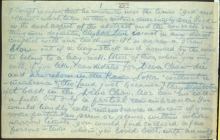
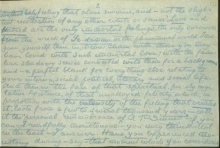
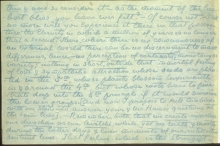
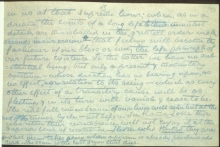
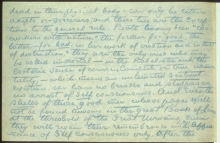
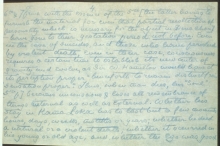
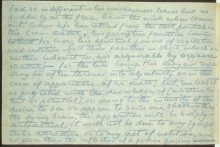

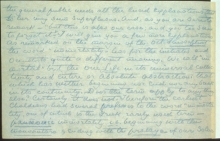
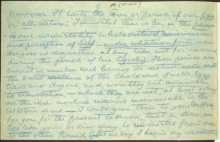

hay rick is a term that has various regional usages, but here it may refer to the criss-crossed stacking of bales of hay.